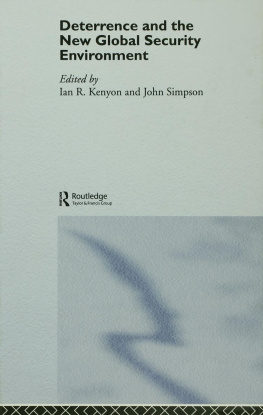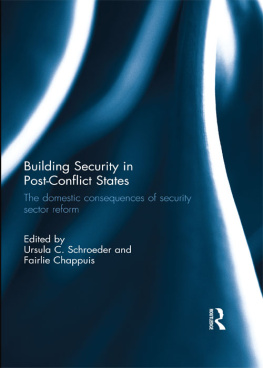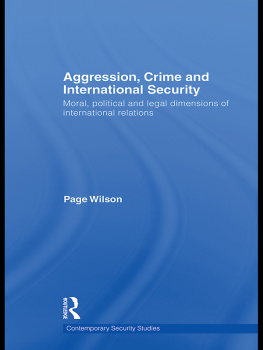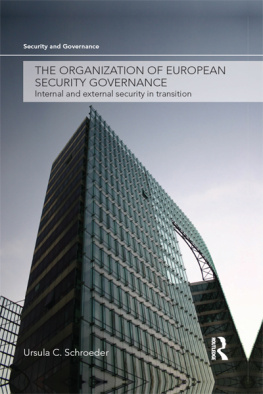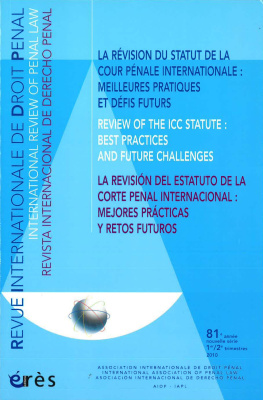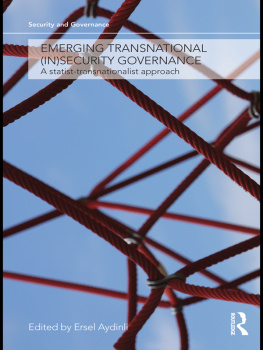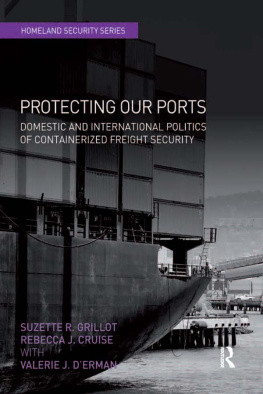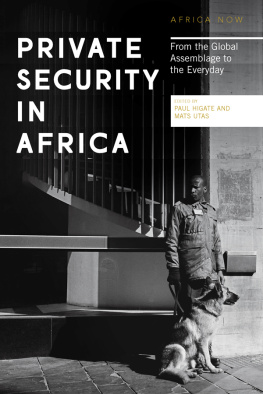Reordering Security
Traditional security distinctions are being rapidly eroded. Lines drawn between war and crime are blurring with fateful consequences for divisions between militaries and police forces. The assumption that security should be a publicly provided good has been challenged by private security providers, both domestic and international. Security is no longer (if it ever was) divided between what goes on inside one state and what occurs between states. However, our disciplinary tools for examining these security challenges remain resolutely focused on either the domestic or the international. This book makes one of the first attempts to examine security from both perspectives, bringing together, and into much needed conversation, the fields of criminology and international relations.
This book was originally published as a special issue of Global Crime.
Ian Loader is Professor of Criminology at the University of Oxford, UK and a Fellow of All Souls College. His books include Civilizing Security (with Neil Walker, 2007) and Public Criminology (with Richard Sparks, 2010). He is currently working on a book with the working title A Better Politics of Crime.
Sarah Percy is Professor of International Relations at the University of Western Australia. She is the author of several works considering the differences between public and private security and the distinction between war and crime, including Mercenaries: The History of a Norm in International Relations (2007), and The Business of Piracy in Somalia (with Anja Shortland, Journal of Strategic Studies, 2013).
Reordering Security
Crossing the Criminology/IR Divide
Edited by
Ian Loader and Sarah Percy
First published 2015
by Routledge
2 Park Square, Milton Park, Abingdon, Oxon, OX14 4RN, UK
and by Routledge
711 Third Avenue, New York, NY 10017, USA
Routledge is an imprint of the Taylor & Francis Group, an informa business
2015 Taylor & Francis
All rights reserved. No part of this book may be reprinted or reproduced or utilised in any form or by any electronic, mechanical, or other means, now known or hereafter invented, including photocopying and recording, or in any information storage or retrieval system, without permission in writing from the publishers.
Trademark notice: Product or corporate names may be trademarks or registered trademarks, and are used only for identification and explanation without intent to infringe.
British Library Cataloguing in Publication Data
A catalogue record for this book is available from the British Library
ISBN 13: 978-1-138-84219-9
ePub eISBN 13: 978-1-317-55292-5
Mobipocket/Kindle eISBN 13: 978-1-317-55291-8
Typeset in Times New Roman
by RefineCatch Limited, Bungay, Suffolk
Publishers Note
The publisher accepts responsibility for any inconsistencies that may have arisen during the conversion of this book from journal articles to book chapters, namely the possible inclusion of journal terminology.
Disclaimer
Every effort has been made to contact copyright holders for their permission to reprint material in this book. The publishers would be grateful to hear from any copyright holder who is not here acknowledged and will undertake to rectify any errors or omissions in future editions of this book.
Contents
Ian Loader and Sarah Percy
Caroline Holmqvist
Katja Franko Aas
Deborah Avant and Virginia Haufler
Bruce Baker
Alexandra Gheciu
Michael C. Williams
The chapters in this book were originally published in Global Crime, volume 13, issue 4 (November 2012). When citing this material, please use the original page numbering for each article, as follows:
Chapter 1
Editorial: Bringing the outside ?in and the inside out: crossing the criminology/ IR divide
Ian Loader and Sarah Percy
Global Crime, volume 13, issue 4 (November 2012) pp. 213218
Chapter 2
War/space: shifting spatialities and the absence of politics in contemporary accounts of war
Caroline Holmqvist
Global Crime, volume 13, issue 4 (November 2012) pp. 219234
Chapter 3
(In)security-at-a-distance: rescaling justice, risk and warfare in a transnational age
Katja Franko Aas
Global Crime, volume 13, issue 4 (November 2012) pp. 235253
Chapter 4
Transnational organisations and security
Deborah Avant and Virginia Haufler
Global Crime, volume 13, issue 4 (November 2012) pp. 254275
Chapter 5
State and substate policing in Africa and the boundaries between them
Bruce Baker
Global Crime, volume 13, issue 4 (November 2012) pp. 276292
Chapter 6
Securing distant places? Practices of protection in contemporary peace-support operations
Alexandra Gheciu
Global Crime, volume 13, issue 4 (November 2012) pp. 293311
Chapter 7
The new economy of security
Michael C. Williams
Global Crime, volume 13, issue 4 (November 2012) pp. 312319
Please direct any queries you may have about the citations to
clsuk.permissions@cengage.com
Caroline Holmqvist is Senior Lecturer in War Studies at the Swedish National Defence College, Stockholm and currently a Visiting Fellow at the Centre for International Studies, London School of Economics and Political Science.
Katja Franko Aas is Professor of Criminology at the Institute of Criminology and Sociology of Law, University of Oslo, Norway. She has published widely on globalisation, borders, security and surveillance of everyday life. She is the author of Cosmopolitan Justice and Its Discontents (co-edited with C. Baillet, Routledge, 2011), Technologies of Insecurity (co-edited with H.M. Lomell and H.O. Gundhus, Routledge-Cavendish, 2009), Globalization and Crime (SAGE, 2007) and Sentencing in the Age of Information: From Faust to Macintosh (Routledge-Cavendish, 2005).
Deborah Avant is the Si Chou-Kang Chair of International Security and Diplomacy and Director of the Si Chou-Kang Center for International Security and Diplomacy at the Josef Korbel School of International Studies, University of Denver, USA. Her research has focused on civilmilitary relations, military change, and the politics of controlling violence. She is the author/editor of Who Governs the Globe? (with Martha Finnemore and Susan Sell, Cambridge: Cambridge University Press, 2010), The Market for Force: The Consequences of Privatizing Security (Cambridge: Cambridge University Press, 2005), and Political Institutions and Military Change: Lessons from Peripheral Wars (Ithaca, NY: Cornell University Press, 1994), along with articles in many journals.
Virginia Haufler (Cornell 1991) is a Professor in the Department of Government and Politics at the University of Maryland, USA, and Director of the Global Communities undergraduate programme. She is an Associate of the Center for International Development and Conflict Management and the Harrison Program on the Future Global Agenda. Her research and publications focus on the governance of global corporations through standard-setting, transnational business regulation, and corporate social responsibility. She has been a Visiting Scholar at the University of California, Irvine; a Visiting Non-Resident Fellow at the Center on Public Diplomacy at the University of Southern California; and a Senior Associate at the Carnegie Endowment for International Peace. She currently serves on the Scientific Advisory Board of the Peace Research Institute Frankfurt (PRIF) and the One Earth Future (OEF) Foundation, and formerly served as an officer and board member of Women in International Security (WIIS).


